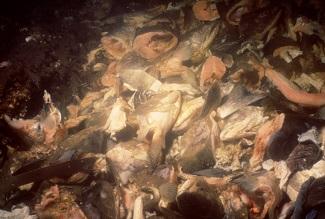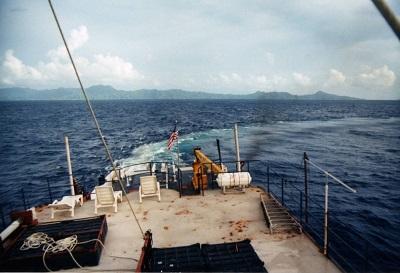Ocean Disposal of Fish Wastes
Under the Marine Protection, Research and Sanctuaries Act (MPRSA), a permit is not required for the ocean disposal of fish wastes unless such disposal occurs in:
- harbors or other protected or enclosed coastal waters; or
- any other location where EPA finds that such disposal may reasonably be anticipated to endanger health, the environment or ecological systems.
Environmental Concerns for Disposing of Fish Wastes
in the Ocean
 Fish waste may include, but is not limited to, particles of flesh, skin, bones, entrails, shells or liquid stick water. Fish wastes degrade rapidly in warm temperatures. If not appropriately stored or managed, fish wastes create aesthetic problems and strong odors as a result of bacterial decomposition. The organic components of the waste have a high biological oxygen demand and, if not managed properly, high oxygen demand poses environmental and health problems. Some fish wastes are transported for disposal at sea. Environmental concerns associated with disposal of fish wastes into ocean waters include:
Fish waste may include, but is not limited to, particles of flesh, skin, bones, entrails, shells or liquid stick water. Fish wastes degrade rapidly in warm temperatures. If not appropriately stored or managed, fish wastes create aesthetic problems and strong odors as a result of bacterial decomposition. The organic components of the waste have a high biological oxygen demand and, if not managed properly, high oxygen demand poses environmental and health problems. Some fish wastes are transported for disposal at sea. Environmental concerns associated with disposal of fish wastes into ocean waters include:
- reduced oxygen levels in the seawaters at the ocean bottom;
- burial or smothering of living organisms; and
- introduction of disease or non-native and invasive species to the ecosystem of the sea floor.
Marine Protection, Research and Sanctuaries Act (MPRSA) Permits for Fish Waste
 Ocean disposal of fish waste.
Ocean disposal of fish waste.
EPA has issued special permits and research permits under the MPRSA for the ocean disposal of fish wastes. Please see our Special and Research Permits for Ocean Dumping Web page for examples of MPRSA permits for fish wastes.
Learn More about Ocean Dumping of Fish Wastes
Guidance is available from the London Convention and London Protocol:
- Specific Guidelines for the Assessment of Fish Wastes or Material Resulting from Industrial Fish Processing Operations; and
- 2012 Guidelines for the Development of Action Lists and Action Levels for Fish Waste.
The Guidelines are available on the London Convention/London Protocol website, and the publications can be obtained from IMO Publishing.
